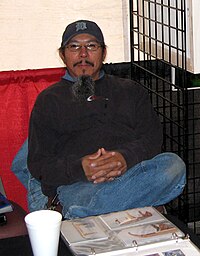Odaawaa

Dennis Esquivel, Odawa-Ojibwe artist
|
|
| Total population | |
|---|---|
| (15,000) | |
| Regions with significant populations | |
|
United States (Oklahoma, Michigan) Canada (Ontario) |
|
| Languages | |
| English, Ojibwe (Ottawa dialect) | |
| Religion | |
| Midewiwin, Animism, traditional religion, Christianity, other | |
| Related ethnic groups | |
| Ojibwe, Potawatomi, and other Algonquian peoples |
The Odawa (also Ottawa or Odaawaa /oʊˈdɒwə/), said to mean "traders," have long had territory that crossed the current borders of the United States, where they are federally recognized as Native American tribes, and Canada, where there are numerous recognized First Nations bands. They are one of the Anishinaabeg, related to but distinct from the Ojibwe and Potawatomi peoples.
After migrating from the East Coast in ancient times, they settled on Manitoulin Island, near the northern shores of Lake Huron, and the Bruce Peninsula in the present-day province of Ontario, Canada. They considered this their original homeland. After the 17th century, they also settled along the Ottawa River, and in the state of Michigan, United States, as well as through the Midwest south of the Great Lakes in the latter country. In the 21st century, there are approximately 15,000 Odawa living in Ontario, and Michigan and Oklahoma (former Indian Territory, United States).
The Odawa language is part of the Algonquian language family. This large family has numerous smaller tribal groups or “bands,” commonly called “Tribe” in the United States and “First Nation” in Canada. Their language is considered a divergent dialect of Ojibwe, characterized by frequent syncope.
...
Wikipedia
